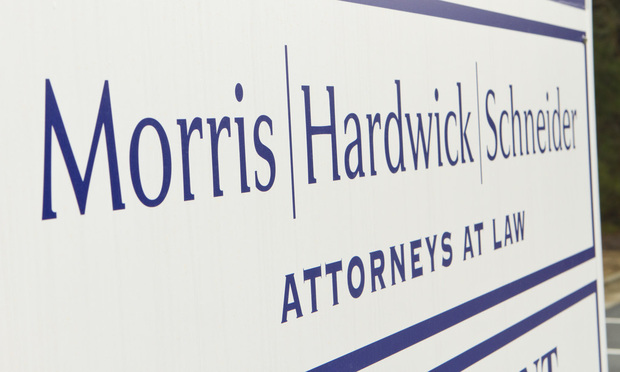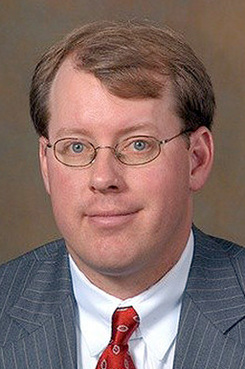Hardwick's Ex-Partner Tells Jurors $26M in Firm 'Distributions' Were Not Legit
With closing arguments set for Thursday, Mark Wittstadt returned to the stand as the final witness in Nathan Hardwick's embezzlement trial.
October 11, 2018 at 07:51 AM
7 minute read
 (Photo: John Disney/ALM)
(Photo: John Disney/ALM)
Nathan Hardwick IV's ex-law partner, Mark Wittstadt, returned to the stand on Wednesday to tell the jury there was no legitimate way Hardwick could have taken $26 million out of their now-defunct residential real estate closing firm over three-and-a-half years without it going bankrupt.
Hardwick had unexpectedly taken the stand himself on Tuesday as the defense's final witness, for a full day of direct testimony conducted by his attorney, Ed Garland. Closing arguments are scheduled for Thursday morning after 12 days of testimony.
 Nathan Hardwick.
Nathan Hardwick.Wittstadt appeared Wednesday afternoon after Hardwick's cross-examination as the government's sole rebuttal witness. He kept things simple for the jury, which has appeared confused at many points during testimony in the complicated, document-intensive case—particularly when it was about the residential real estate firm's financials, accounting and tax reporting.
There was no way Morris Hardwick Schneider could have afforded to pay out $26 million to Hardwick over the three-and-a-half years in question, Wittstadt told Assistant U.S. Attorney Lynsey Barron, even if it came out of cash available in the operating accounts instead of Hardwick's profit distributions alone from net income.
“We could never have been able to distribute that. We would have gone bankrupt,” Wittstadt said.
The $26 Million
The government has accused Hardwick of embezzling $26 million from his now-defunct residential real estate firm, Morris Hardwick Schneider, from 2011 to August 2014, when escrow account shortfalls came to light. The firm went bankrupt 11 months later.
That included $19.5 million from the IOLTA accounts, Assistant U.S. Attorney J. Russell Phillips told the jury when he cross-examined Hardwick on Wednesday.
To drive home the point that the $26 million Hardwick took from the firm was all for his personal use, Phillips hefted three giant binders of spending documentation for private jets, casinos and female social companions, respectively, and set them before Hardwick on the witness stand.
Hardwick, who owned 55 percent of MHS, ran the Atlanta-based closing operation, while Mark Wittstadt and his brother Gerard, who owned 22.2 percent apiece, ran the separate default operation from Baltimore.
Hardwick is charged with 23 counts of wire fraud, wire fraud conspiracy and making false statements to lenders.
Prosecutors indicted the closing operation's former controller, Asha Maurya, as a co-conspirator, alleging that Hardwick directed her to wire millions of dollars from MHS's escrow and operating accounts to pay his personal bills.
Maurya, who has admitted to stealing almost $900,000 from MHS, pleaded guilty to a single count of wire fraud last year and is cooperating with the government, but prosecutors did not put her on the stand. Hardwick's lawyers at Garland, Samuel & Loeb have maintained that she was the sole culprit for MHS's almost $30 million in escrow shortfalls, not their client.
Distributions or Theft?
The government alleges that Hardwick knowingly took too much money from MHS and that he knew it came from the escrow accounts.
The defense has stirred up some confusion over what monies MHS's equity partners could legitimately take from the firm by using the term “distributions” to mean any money (other than salary and expense reimbursements) that MHS paid out to its equity partners—not solely profit distributions from the firm's net income.
Hardwick told the jury on Tuesday that MHS's owners could receive distributions as long as the firm had enough cash available in its operating accounts to cover them and the other owners received their proportionate share. He added that his $26 million from MHS came from distributions that Maurya, the former controller, told him the firm could afford.
During Hardwick's testimony, Garland showed the jury daily summaries of MHS's operating account balances to demonstrate the firm had several million dollars in available cash for the dates of Hardwick's 20 withdrawals of $100,000 to $500,000 that triggered the federal wire fraud charges.
But Wittstadt told the jury that there's a big difference between a firm's available operating cash and income that can be paid out to the shareholders. “When you run a business it's not what you have in your checking account that's important,” he said.
What's more, MHS did not make enough in net income to cover $26 million in profit distributions to Hardwick, Wittstadt said, much less to distribute proportionate sums, per the shareholder agreement, to the other equity partners, who collectively owned about 50 percent of the firm—for a total of roughly $50 million.
The firm's net income from 2011 to 2013 was about $10 million, according to its audited financial statements.
Any distributions to partners “above and beyond our salary were covered in the shareholder agreement,” Wittstadt added. “We had no ability to take money other than what the firm made.”
Escrow Hole
Forensic accountant J.P. Gingras, an expert witness for the defense, told jurors last week that the $26 million to Hardwick received was his own money that he was entitled to as a 55 percent owner of the firm.
Gingras also told the jury there actually weren't any escrow shortfalls, because the firm's 2014 tax return showed only $4.7 million in losses—not a big enough hole to be from depleted escrow accounts at a real estate closing firm where hundreds of millions in mortgage money flowed through the IOLTA accounts.
MHS's main title insurer, Fidelity National Title, spent almost $30 million to fill the IOLTA hole in exchange for ownership of its sister title company, LandCastle Title.
The firm's 2014 tax return “does not mention the hole that Fidelity plugged,” Barron said to Wittstadt on Wednesday. “Does that mean the hole didn't exist?”
“The hole 100-percent existed,” Wittstadt heatedly attested, adding that he worked with accounting firm Bennett Thrasher to prepare the tax return.
Garland suggested on his redirect that the “hole” in MHS's funds was created by the firm “living out of that escrow account,” a reference to the tens of millions in payroll that Maurya paid through an IOLTA wire account over the charged period—not from the $26 million that went to Hardwick.
“No, the hole was created by Mr. Hardwick living out of that escrow account,” Wittstadt replied. “You and I agree on one thing, Mr. Garland. That escrow account was a mess.”
READ MORE:
Hardwick Takes Stand to Defend Against Embezzlement Charges
Hotly Contested Expert in Embezzlement Trial Says Firm Still Owes Hardwick Money
Alleged Co-Conspirator a No-Show as Hardwick Prosecution Rests
Hardwick Spent Law Firm's Millions on Jets, Gambling, GIrlfriends, Jurors Hear
Ex-Partner Tells Jurors That Hardwick Kept Him in the Dark
Hardwick's Ex-Partner Recounts Big Debts, Expenses in Embezzlement Trial
'A Thief and a Liar': Jurors Hear Accusations, Accounting as Hardwick Trial Begins
This content has been archived. It is available through our partners, LexisNexis® and Bloomberg Law.
To view this content, please continue to their sites.
Not a Lexis Subscriber?
Subscribe Now
Not a Bloomberg Law Subscriber?
Subscribe Now
NOT FOR REPRINT
© 2025 ALM Global, LLC, All Rights Reserved. Request academic re-use from www.copyright.com. All other uses, submit a request to [email protected]. For more information visit Asset & Logo Licensing.
You Might Like
View All
Fowler White Burnett Opens Jacksonville Office Focused on Transportation Practice
3 minute read
Georgia High Court Clarifies Time Limit for Lawyers' Breach-of-Contract Claims
6 minute read
Southeast Firm Leaders Predict Stability, Growth in Second Trump Administration
4 minute read
Trending Stories
Who Got The Work
Michael G. Bongiorno, Andrew Scott Dulberg and Elizabeth E. Driscoll from Wilmer Cutler Pickering Hale and Dorr have stepped in to represent Symbotic Inc., an A.I.-enabled technology platform that focuses on increasing supply chain efficiency, and other defendants in a pending shareholder derivative lawsuit. The case, filed Oct. 2 in Massachusetts District Court by the Brown Law Firm on behalf of Stephen Austen, accuses certain officers and directors of misleading investors in regard to Symbotic's potential for margin growth by failing to disclose that the company was not equipped to timely deploy its systems or manage expenses through project delays. The case, assigned to U.S. District Judge Nathaniel M. Gorton, is 1:24-cv-12522, Austen v. Cohen et al.
Who Got The Work
Edmund Polubinski and Marie Killmond of Davis Polk & Wardwell have entered appearances for data platform software development company MongoDB and other defendants in a pending shareholder derivative lawsuit. The action, filed Oct. 7 in New York Southern District Court by the Brown Law Firm, accuses the company's directors and/or officers of falsely expressing confidence in the company’s restructuring of its sales incentive plan and downplaying the severity of decreases in its upfront commitments. The case is 1:24-cv-07594, Roy v. Ittycheria et al.
Who Got The Work
Amy O. Bruchs and Kurt F. Ellison of Michael Best & Friedrich have entered appearances for Epic Systems Corp. in a pending employment discrimination lawsuit. The suit was filed Sept. 7 in Wisconsin Western District Court by Levine Eisberner LLC and Siri & Glimstad on behalf of a project manager who claims that he was wrongfully terminated after applying for a religious exemption to the defendant's COVID-19 vaccine mandate. The case, assigned to U.S. Magistrate Judge Anita Marie Boor, is 3:24-cv-00630, Secker, Nathan v. Epic Systems Corporation.
Who Got The Work
David X. Sullivan, Thomas J. Finn and Gregory A. Hall from McCarter & English have entered appearances for Sunrun Installation Services in a pending civil rights lawsuit. The complaint was filed Sept. 4 in Connecticut District Court by attorney Robert M. Berke on behalf of former employee George Edward Steins, who was arrested and charged with employing an unregistered home improvement salesperson. The complaint alleges that had Sunrun informed the Connecticut Department of Consumer Protection that the plaintiff's employment had ended in 2017 and that he no longer held Sunrun's home improvement contractor license, he would not have been hit with charges, which were dismissed in May 2024. The case, assigned to U.S. District Judge Jeffrey A. Meyer, is 3:24-cv-01423, Steins v. Sunrun, Inc. et al.
Who Got The Work
Greenberg Traurig shareholder Joshua L. Raskin has entered an appearance for boohoo.com UK Ltd. in a pending patent infringement lawsuit. The suit, filed Sept. 3 in Texas Eastern District Court by Rozier Hardt McDonough on behalf of Alto Dynamics, asserts five patents related to an online shopping platform. The case, assigned to U.S. District Judge Rodney Gilstrap, is 2:24-cv-00719, Alto Dynamics, LLC v. boohoo.com UK Limited.
Featured Firms
Law Offices of Gary Martin Hays & Associates, P.C.
(470) 294-1674
Law Offices of Mark E. Salomone
(857) 444-6468
Smith & Hassler
(713) 739-1250






